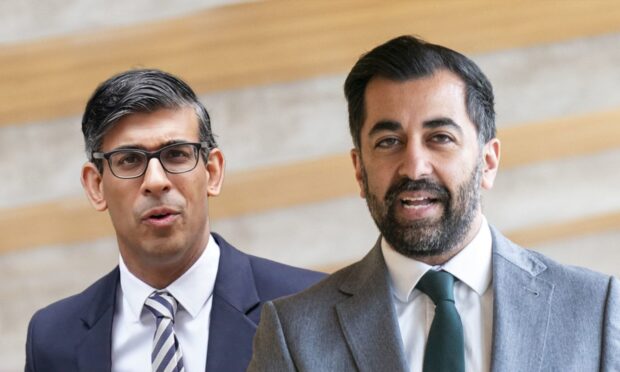The starting gun was effectively fired by Rishi Sunak before the weekend when he said a general election would be later this year.
It was enough to reset the political calendar and put everyone on a campaign footing.
In Scotland, Mr Yousaf knows he has a fight on to keep seats in urban areas and prove there is an appetite for independence.
Labour leader Anas Sarwar is aware he will need help to push Tory MPs.
Here are the main themes as the speeches and campaigns sharpen got under way on Monday.
1. Humza Yousaf needs to woo unionists
The first minister went straight for the pound signs in his heavily trailed speech in Glasgow.
He first rubbished any notion that the general election will get to lead to solutions for the UK.
Then he claimed being independent would make us all £10,200 richer in Scotland outside the UK, based only on how other similar-sized countries are doing now.
It’s part of a plan to conflate Labour and Tories as two sides of the same coin.
And he hopes it will keep the SNP looking good at Westminster – essential if he is to hold on to third place there, and turn the election into a demonstration of support for independence.
And in an attempt to tempt doubters away from Labour, he said: “There will be those who will never support independence.
“That doesn’t mean those people should be dismissed. Far from it.
“There is much to learn from an opposing perspective.”
2. Will the independence question ever go away?
Based on today’s speech by the first minister, no.
Mr Yousaf has already said this is an election entirely based on independence.
But his SNP MP colleague Tommy Shepperd thinks defeat for the party would mean an end to the debate as a live topic.
He sees that framing as a call to action, urging waverers not to go for Labour and Sir Keir Starmer.
But don’t be surprised if the slogan turns up on pro-union leaflets too as the constitution continues to divide small margins of crucial voters.
3. Meanwhile, Anas Sarwar needs to tempt SNP voters
The Scottish Labour leader kicked off his year of campaigning in Rutherglen, the scene of a big byelection victory for him over the SNP last year.
He needs a fair number of recent SNP voters to give him a chance of regaining ground, particularly in urban areas.
So while Mr Yousaf reaches out to Labour voters, Mr Sarwar said: “We may ultimately disagree on the final destination for Scotland.
“But on this part of the journey, let us unite to change our country and get rid of this Tory Government.”
However, that sentiment is open to challenge. Scotland has voted almost solidly Labour in the past and still had a Conservative government at Westminster.
4. Future of devolution at stake?
The general election has no direct policy impact on Holyrood, but Mr Sarwar hopes it will usher an indirect shift for devolution.
He is already looking ahead to the next election along in 2026 for the Scottish Parliament.
A strong showing of Labour MPs in Scotland, he hopes, will lead to a place in government at Holyrood.
“Devolution was never meant to be about two governments fighting with each other and ultimately failing Scots,” he claimed on Monday.
5. Prime Minister Rishi Sunak won’t have to wait too long for an electoral test
The Conservative leader killed of chat of a quick spring election by pushing it to the end of the year, and he is yet to fix a date.
But he’ll be tested quicker than that in potentially damaging byelections.
MP Peter Bone was thrown out by constituents over bullying and sexual misconduct claims. His partner is standing in the Wellingborough constituency in England at some point after February.
Kingswood MP Chris Skidmore sparked another byelection in his seat near Bristol by quitting over plans to guarantee annual oil and gas licensing rounds, a policy Mr Sunak pressed home on a visit to the north-east.
Only Mr Sunak knows when everyone else will get a chance to cast their votes in the general election.





Conversation